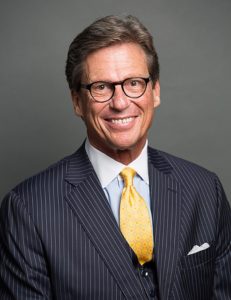Board Profile: Tom Fritsch
Using His Recovery Journey to Give Back to Others
 “I have a passion for recovery. It saved my life,” says Tom Fritsch, president, TJ Fritsch Consulting, LLC.
“I have a passion for recovery. It saved my life,” says Tom Fritsch, president, TJ Fritsch Consulting, LLC.
When he went into treatment in 1997, Fritsch was struggling with alcohol, pills, and cocaine simultaneously. Smoking cigarettes fit right into that paradigm.
“Recovery becomes a way to live a good, healthy productive life,” Fritsch states. “Getting into recovery and working the recovery program has provided that for me. I feel tremendously blessed.”
The power of nicotine
Even Board members recover from tobacco use. Fritsch smoked cigarettes for 26 years.
“I think nicotine is one of the most addictive substances and probably the most toxic substances in the world,” Fritsch relates. He recently found his high school graduation photo pictured in his cap and gown holding a cigarette.
“When I went into treatment, they let me continue to smoke,” Fritsch says. “They wanted me to take care of one thing at a time.”
Fritsch and his wife met in Alcoholics Anonymous (sober 22 years and 38 years respectively), who were both smokers and runners. He said they’d run four to six miles at Memorial Park and then smoke cigarettes afterwards, which he describes as an embarrassing paradox. Eventually they did quit.
“I know how terribly difficult it is because I have some kids who smoke, have tobacco addiction issues,” Fritsch says. “It scares me for them. I think they think they are bullet proof.”
Board role at HRC
Overcoming his own substance use allows Fritsch to contribute a unique understanding of the complexity our clients face in substance use recovery. Fritsch has served on various not-for-profit boards in the last 15 years. Houston Recovery Center is his most recent appointment.
He was first introduced to Houston Recovery Center when he facilitated a board retreat and was later approved for the position by Mayor Turner and the City Council.
Fritsch says over time he developed a passion for working beyond his own recovery program by doing something that gives back to others. “I wanted to be sure that if I was going to commit my time to non-profits that the difference I make went beyond writing a check,” states Fritsch.
Fritsch believes Executive Director Leonard Kincaid is a committed man who has done a great job building and leading the organization. He also sees the board functioning as healthy, impactful members who are committed to the mission and bring different strengths to the table.
“It’s super to be part of the organization,” Fritsch relates.
Looking to the future
Fritsch believes Houston Recovery Center has evolved into an organization that is playing a much bigger role than what was originally intended. He says they see the possibility of it becoming a conduit to start pulling together the disparate entities and initiatives that exist in service of recovery or prevention.
“If people understood how Houston Recovery Center has evolved and understood what is possible in its future, we could convey a story showing a very unique service to our community,” Fritsch says. “And how a dollar contributed multiplies into something greater in terms of the impact it can have, most importantly on the lives and souls of people who are aided by it.”
Houston is the second largest philanthropic giving city in the country, according to Charity Navigator. Fritsch agrees that it’s a generous city with a lot of money here. Part of the board’s shift in thinking strategically, he adds, is how to engage the broader philanthropic community in supporting Houston Recovery Center’s mission.
“The more we can balance our dependency on various funding sources, the healthier and more sustainable Houston Recovery Center will be over the long-term,” Fritsch adds. “Every person who can become a success story is not only a heart-warming story but it’s good economically, it’s good socially, it’s good institutionally. There is no shortage of upside.”